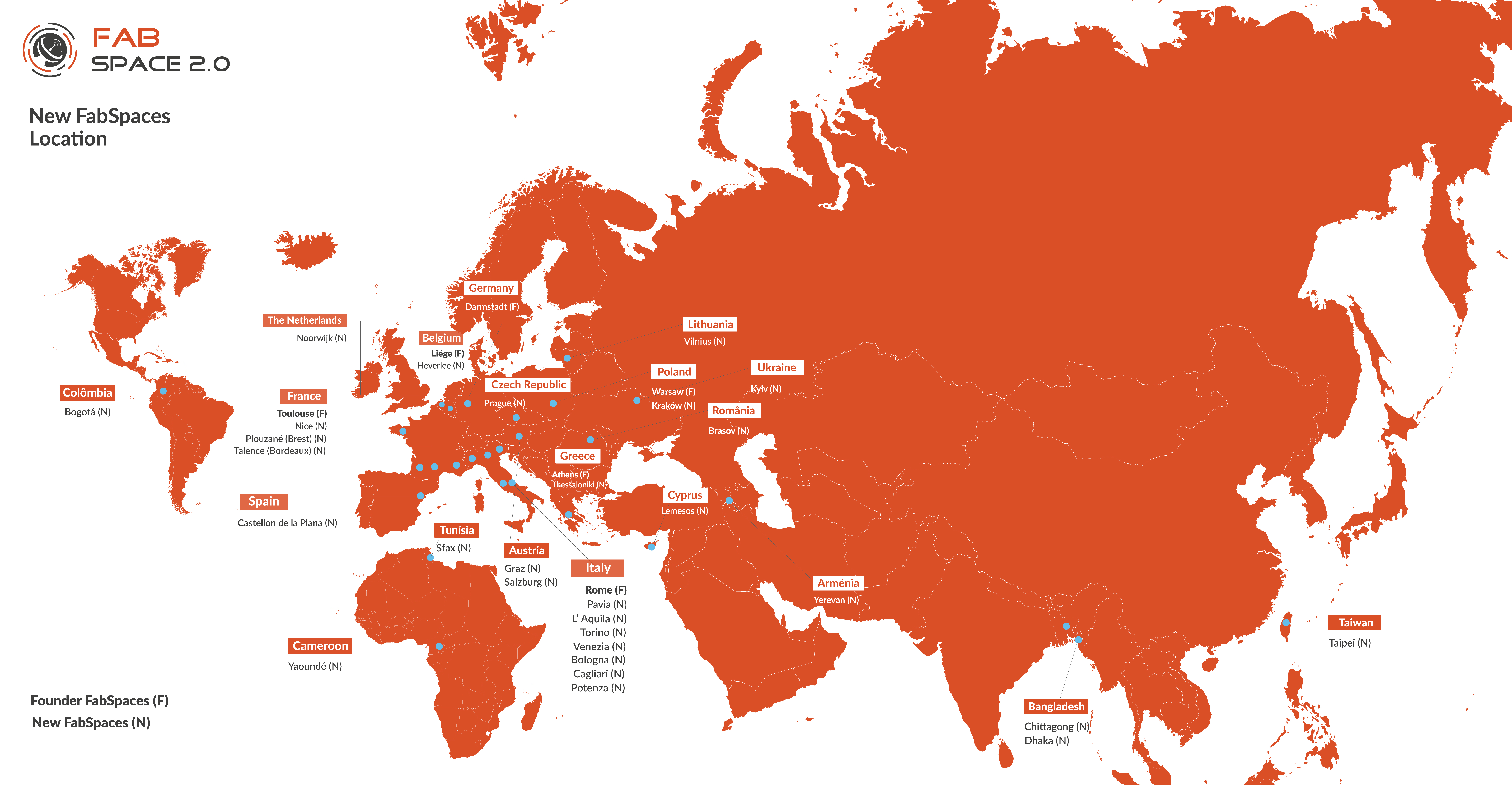The FabSpace 2.0 project today launched its international network expansion with 15 new FabSpaces located in various countries worldwide during the ESA Earth Observation Φ-week which is held on the 12th – 16th of November 2018 in ESA-ESRIN, Italy. The Φ-week event (http://phiweek.esa.int/) is organised by The European Space Agency (ESA) focusing on EO Open Science and FutureEO and aimed to review the latest developments in Open Science trends and kick-start innovative activities of the recently created Φ-department looking at FutureEO, and its associated Φ-lab aiming to identify, support and scale bold EO ideas.
The 15 new FabSpaces complement the existing 20 FabSpaces and will help consolidating the FabSpace 2.0 project’s mission all over the world, disseminating the services and helping to address the needs of final users of Earth Observation and geodata-based applications. This year international expansion is the continuation from the last year first expansion and had achieved the FabSpace´s goal to be extended worldwide.
“It is so exciting to think that the 6 founders FabSpaces and the 14 new FabSpaces that joined in January 2018 – half of them being now open – are now welcoming in November 2018 the 15 extra new FabSpaces! We can now be confident in the expansion and the sustainability of the FabSpace 2.0 international network on a global scale”, said Josiane Mothe from University Toulouse III – Paul Sabatier (UPS), the Coordinator of FabSpace 2.0.
The application opening had started from July this year and the selection process took place on October. After going through a selection process, the consortium and the External Advisory Board of FabSpace 2.0 selected 15 new FabSpaces to contribute in highlighting the achievement of European space programmes and thereby European space data and broadcast a standard to foster open innovation in Universities 2.0 and possibly develop new applications and services enabled by space related data.
A local University or Educational Institutions compose each new FabSpace. The new FabSpaces will be opened at the beginning of 2019 and are joining the existing FabSpace 2.0 network. The new 15 FabSpaces are:
| Graz FabSpace (Austria) – TU Graz, Graz University of Technology, Graz;Salzburg FabSpace (Austria) – University of Salzburg, Department of Geoinformatics Z_GIS, Salzburg; Chittagong FabSpace (Bangladesh) – University of Chittagong, Department of Computer Science and Engineering, Chittagong; Dhaka FabSpace (Bangladesh) – Geo Planning for Advanced Development (GPAD), Urban and Rural Planniing Discipline, Khulna University, Dhaka;Heverlee FabSpace (Belgium) – Spatial Applications Division Leuven, KU Leuven, Heverlee; Bogotá FabSpace (Colombia) – Universidad de Los Andes, School of Engineering, Universidad Nacional de Colombia, Bogotá; Thessaloniki FabSpace (Greece) – Faculty of Agriculture, Forestry and Natural Environment, School of Agriculture, Laboratory of Remote Sensing, Spectroscopy and GIS, Aristotle University of Thessaloniki; | Bologna FabSpace (Italy) – University of Bologna – DICAM Dept., Bologna; Cagliari FabSpace (Italy) – Department of Chemical and Geological Sciences, University of Cagliari, Monserrato; Potenza FabSpace (Italy) – Laboratorio per l´Analisi dei Dati satellitari (LADSAT), School of Engineering, Universita della Basilicata, Potenza; Kraków FabSpace (Poland) – Department of Geoinformatics and Applied Computer Science, University of Science and Technology in Kraków;Brasov FabSpace (Romania) – Transilvania University of Brasov, Brasov; Taipei FabSpace (Taiwan) – Department of Civil Engineering, National Chiao Tung University, Hsinchu; Sfax FabSpace (Tunisia) – Sfax ICT Technopark, Computer science and communication department, Faculty of Sciences of Sfax; Kyiv FabSpace (Ukraine) – EOS Data Analytics Kyiv, Institute of Agroecology and Land Management, National University of Water and Environmental Engineering Ukraine. |

